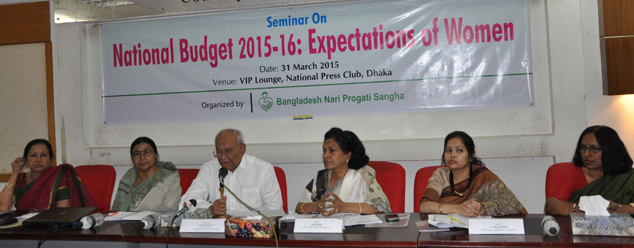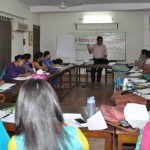
Bangladesh Nari Progati Sangha (BNPS) organized a Seminar on “National Budget 2015-16: Expectations of Women,” which was held on 31 March 2015 at the VIP Lounge of National Press Club, Dhaka. This seminar was chaired by BNPS Executive Director Rokeya Kabir. Former Senior Research Fellow of BIDS Dr. Pratima Paul-Majumder presented the keynote paper. Dr. Saima Haq Bidisha, Associate Professor of the Department of Economics of Dhaka University, Tapati Saha, Coordinator, Women’s Economic Empowerment program, UN women and Salma Khan, Former Chairperson of CEDAW committee were the panel discussants.
Former Deputy Speaker and Member of the Parliamentary Standing Committee of Planning Ministry, Shawkat Ali, MP, attended the seminar as the chief guest. Journalist Bivu Ranjan Sarker, Saheen Akter Doli, Executive Director of Nari Maitree, Majeda Sawkat Ali, Executive Director of Noria Unnayan Samittee, Former Professor Najma Siddique, Umme Salma, Mahila Parishad, Jana Gosshami, Chanchana Chakma, Md. Sohel Rana, Program Coordinator, UN Women also spoke on the seminar.
Dr. Majumder said, the 2014-15 budget was particularly disappointing, as the total budgetary allocation for women, by bringing their empowerment into the fold of mainstream national development. The allocation has been decreased even as the number of gender-sensitive projects has been increased. Despite of everything, women continue to lag behind men in terms of achieving parity in almost every field. Dr. Majumder said this can be addressed, but safety-net programmes like Vulnerable Group Development (VGD), Vulnerable Group Feeding (VGF) or microcredit support are not enough, these won’t be able to ensure the ultimate development of women. Rather, she advised ensuring proper budgetary allocation in women’s education, health, safe housing, transportation and training on IT sector.
Observing that water, electricity and fuel are very influential elements for women’s empowerment, the chief guest of the event Mr. Shawkat Ali suggested introducing separate quota system on every one of these for women. He also stressed on separate budgetary allocation and projects in order to meet women’s own special needs and fix problems. Rokeya Kabir said, merely increasing the budgetary allocation for women is not enough, the government must also monitor and evaluate whether allocated budget expenditure in respective sectors is maintaining standards. She also demanded 13 percent of budgetary allocation directly for women for the 2015-16 fiscal years.


